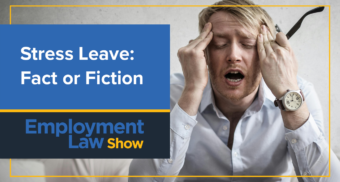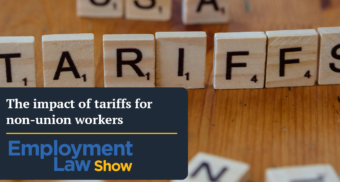Employment Law Show – Season 5 Episode 14
Episode Summary
FEDERALLY REGULATED EMPLOYEES: WHAT THEY NEED TO KNOW, reduced hours after a layoff, harassment at the workplace, and more on Season 5 Episode 14 of the Employment Law Show with employment lawyer Lior Samfiru, Partner at Samfiru Tumarkin LLP.
Watch above to discover your workplace rights and learn everything you need to know about employment law in Ontario, British Columbia, and Alberta, on the only employment law show on both TV and radio in Canada.
Episode Notes
No severance offered for an independent contractor
I’m a fitness instructor and was let go after 12 years at the same gym, full-time. I was called an independent contractor and so was not given severance. Is this right?
- Misclassification: Individuals are often misclassified as independent contractors when they are in fact employees. Fitness instructors that work exclusively with a specific gym, as well as consistent hours, are likely considered employees and so are owed severance.
Reduced hours upon return from temporary layoff
My employer is recalling me from a COVID-19 temporary layoff but will reduce my workweek from 5 days to 3 days. Should I send them a note to protest the change? They said that if I don’t return to work in 7 days, I will lose my severance.
- Changes to your hours of work: Employers cannot reduce hours significantly without an employee’s consent and an employee can treat this change as a constructive dismissal and pursue severance entitlements.
Terminated due to COVID-19 isolation
I was fired from a senior management position after quarantining due to COVID-19 exposure. When I asked about severance, I was told that because I had only worked there for 2 years, I didn’t meet the minimum qualifications for severance. Is that true?
- Penalizing employees: Employees cannot be penalized for following health and safety guidelines, it is a protected leave of absence; this would be an illegal termination. Short term employees are also entitled to severance pay.
LEARN MORE
• COVID-19 Knowledge Centre
• COVID-19 Layoff Rules
Federally regulated employees: What they need to know
- Difference between federally and provincially regulated: There are certain jobs that are regulated by the federal government as opposed to the provincial government, such as jobs at banks. The vast majority of employees in Canada are provincially regulated.
- How to tell if you’re federally regulated: Employees can ask their employer whether or not they are federally regulated as well as checking online resources that list federally regulated industries or federally regulated companies.
- Firing federally regulated employees without a reason: An employer cannot let a federally regulated employee go for any reason and will have to prove there is a valid reason. If a federally regulated employee wants to return to their previous position, they can request to be re-instated.
- Severance packages: Federally regulated employees are entitled to the same full amount of severance as provincial employees however the minimum requirements might differ.
- Temporary Layoffs: Federally regulated employees can choose to accept a temporary layoff or treat the layoff as termination and pursue their severance entitlements.
- Contact an Employment Lawyer: Employees should contact an employment lawyer if they have been let go from their position, laid off temporarily as well as if they’ve put on a performance improvement plan, etc.
Company shutting down due to COVID-19
The private electrical company my wife works for is shutting down because of a lack of work due to COVID-19. If they end up closing their doors for good, would she be owed severance pay?
- Severance in company closure: If a company has shut down, employees are considered regularly terminated and are still owed severance entitlements. Companies that have filed for bankruptcy however might be allowed to delay severance payments.
Harassment at the workplace leads to resignation
My friend is being harassed at the place he has worked at for over 14 years. I told him that he needs to document everything in writing. Would he be able to leave with severance pay?
- Resignation with severance: If an employee is harassed in the workplace, their employer has an obligation to properly investigate the alleged harassment complaint. Employees should make sure the complaints are documented in writing. However, if an employer has not properly conducted an investigation or fixed the issue, an employee can resign and will still be owed severance.
My employer is pressuring me to retire
The owner is asking me to retire after 13 years with the company (I’m 68) so they can reduce staff costs to weather COVID-19. If I don’t, they said they may have to fire me with two weeks’ notice. What are my rights?
- Forced Retirement: Employers cannot force an employee to retire, as there is no set age an employee is required to retire. Employers who choose to terminate an employee due to their age are committing a human rights violation. This is also a wrongful dismissal as an employee in this situation will be owed considerable severance.
NEXT EPISODE: Employment Law Show S5 E15 – What you need to know about workplace terminations
PREVIOUS EPISODE: Employment Law Show S5 E13 – Termination Without Cause: What you need to know




